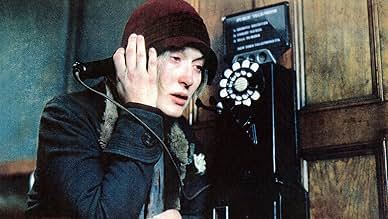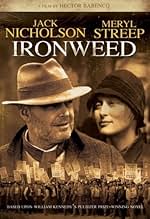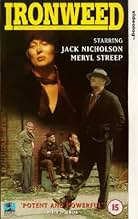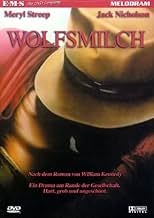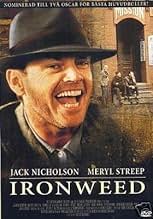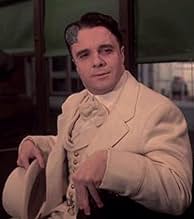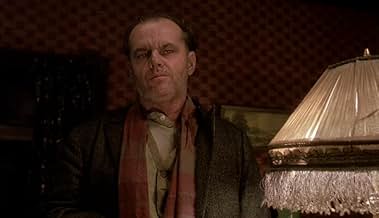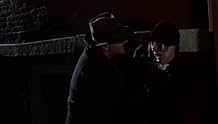VALUTAZIONE IMDb
6,7/10
10.511
LA TUA VALUTAZIONE
Un vagabondo alcolizzato trascorre Halloween nella sua città natale di Albany, New York, dopo essere tornato lì per la prima volta da decenni.Un vagabondo alcolizzato trascorre Halloween nella sua città natale di Albany, New York, dopo essere tornato lì per la prima volta da decenni.Un vagabondo alcolizzato trascorre Halloween nella sua città natale di Albany, New York, dopo essere tornato lì per la prima volta da decenni.
- Candidato a 2 Oscar
- 2 vittorie e 4 candidature totali
Recensioni in evidenza
Jack Nicholson usually relies on his quirky mannerisms and catch phrases; in this movie he shows his acting talents in a more serious manner. This movie is a brutal look at street people in the late 1930s. Meryl Streep immerses herself into her part as usual. This movie is harsh, cold and depressing. And the running time almost pushes two and a half hours long. I honestly don't know what they could have left out to make it shorter. Once is enough for this one. It will take a while for you to get your mind off of the abundance of hardship and sadness.
Nicholson and Streep are joined with a solid, diverse cast that includes Carroll Baker, Michael O'Keefe, Tom Waits, Nathan Lane and Fred Gwynne.
Nicholson and Streep are joined with a solid, diverse cast that includes Carroll Baker, Michael O'Keefe, Tom Waits, Nathan Lane and Fred Gwynne.
I had seen this movie when it first came out, and just seemed hopelessly depressing. Good acting and sets, but a story with little hope for anyone. Recently I re-watched it and have an appreciation for its accurate depiction of alcoholism. I think this story could take place in any decade and have the same outcome. But the fact its in the depression era drives it all home that much harder. Francis (Nicholson) plays a down trodden bum all too familiar with the alleys and soup kitchens of 1938 Albany NY. He has a casual relationship with Helen (Streep) who seems very down on her luck too. If Francis can stay sober for a few days, the kind priest at the mission finds him odd jobs for pay. But soon as Francis works, he drinks again. Helen also is quite a drinker, and the two try to take care of each other finding places to sleep and getting food to eat. Paying attention to the dialog and flashbacks, the viewer learns Francis and Helen had fairly illustrious and gruesome pasts. Francis is prone to seeing many 'ghosts' haunt him still. In a way to confront his past, he returns to his wife and family he had abandoned after a tragedy a few decades earlier. He makes amends as best he can, but redemption seems to get more elusive for him. Not that the film takes any hard stance on alcoholism, but I'd say shows that it's truly an incurable disease that can torture a person to utter hopelessness and still continue. Past accomplishments, future dreams, true love and devotion and loss are all meaningless when there's another drink to be had. So the movie I don't think will either sober a true alcoholic up by watching it - but may help? Nor do I think it will encourage anyone to take up the profession seriously - unless they already have the infliction? But to the good christian that is naive to the vices many of us get addicted to, I think this movie realistically shows the destructive torment and survival alcohol can cause, regardless of success, tragedy, or current blight. Beautifully ugly.
Never the timing for a movie had been so disastrous.Released in those "glorious " eighties when the success stories and the triumphalist heroes were the golden rule,"Ironweed" stood no chance at all.Two tramps did not fit well in the movie landscape of those "feel good" times.And two tramps played by two megastars ,it was unforgivable!
The cast is stellar,but it's Meryl Streep whom I will remember FOREVER.When she sings her little tune "he's me pal" she's so heart-wrenching that she will move you to tears."At least ,I didn't betray anybody" she said.Although it was a colossal flop,Streep would only approach such an emotion afterwards.(notably in "the bridges of Madison County")Nicholson was equally courageous to play such a demeaning part,and he gets strong support from Carroll Baker who proves here she can age gracefully and from Tom Waits ,ideally cast as a barfly.
"Ironweed" is very hard to see nowadays.One of these days ,it will be given the place it deserves.
The cast is stellar,but it's Meryl Streep whom I will remember FOREVER.When she sings her little tune "he's me pal" she's so heart-wrenching that she will move you to tears."At least ,I didn't betray anybody" she said.Although it was a colossal flop,Streep would only approach such an emotion afterwards.(notably in "the bridges of Madison County")Nicholson was equally courageous to play such a demeaning part,and he gets strong support from Carroll Baker who proves here she can age gracefully and from Tom Waits ,ideally cast as a barfly.
"Ironweed" is very hard to see nowadays.One of these days ,it will be given the place it deserves.
There are many reasons why this film is a masterpiece, but the most significant element is surely Streep's portrayal of a homeless alcoholic in 1930's Albany. Her appearance, about half an hour into the film, is quite frankly, astonishing. She walks into a soup kitchen and sits down next to Nicholson and your jaw drops at the transformation. Beyond the technical virtuosity, you marvel at the choices that Streep makes that express the character so movingly, from the vocal production which is almost like a groan of pain, to the body language including her constantly averted glance and shuffling walk which express the woman's lost self esteem, to her bursts of rage when we see the glimmer of the spirit she once posessed. There's a scene in a bar in which she sings for the patrons that you will never forget.
Every other element of the film succeeds: the other performances (Nicholson, Tom Waits and Carol Baker stand out), the production design recreating a vanished era flawlessly without resorting to the phony perfection of say a Merchant Ivory film, the sound design which is surprisingly complex for such an intimate film, the screenplay, the cinematography, the direction. How is it that Hector Babenco has only made two films since this one?
Every other element of the film succeeds: the other performances (Nicholson, Tom Waits and Carol Baker stand out), the production design recreating a vanished era flawlessly without resorting to the phony perfection of say a Merchant Ivory film, the sound design which is surprisingly complex for such an intimate film, the screenplay, the cinematography, the direction. How is it that Hector Babenco has only made two films since this one?
Have you ever wondered what's it's like to be homeless? To most of us, it's as foreign an existence as the medieval world of Hugh Capet. And yet, it's a way of life that's within reach of all of us. And I'm not talking about its physical proximity, about the unfortunates we pass on the streets with their bed rolls on their backs: on the contrary, I'm referring to its spiritual, psychological proximity, to all the rest of us, who, given the right circumstances, could give up on our cheery Western materialist society and wander off into the shadows.
Ironweed takes its viewers into that shadowy world of the rail yards, cardboard shantytowns, underpasses, and abandoned automobiles, and shows us incisive glimpses of how a person arrives there. Featuring what I think are the very best performances by Jack Nicholson and Meryl Streep, Ironweed gets us deep into the sooty, grimy, bilious skin of the two `hobos.' Like Schindler's List, Ironweed is dark poetry. When the movie is over, you're haunted for days by the imagery.
Set in Albany during the Great Depression, Ironweed delivers not an ounce of moralizing. It's like a clinical exposition of the homeless person's entire life, both from without, and within. On the outside, of course, there's the Depression: a society doing the best it can to get by. From the `hobo's' point of view, one feels the implicit violence of a culture taught to view others as economic instruments of their own survival. The homeless, of course, are on the bottom end of the food chain. On the inside, Ironweed takes us into the intense pain of dashed hopes and expectations. From within and without, the homeless are caught in a whirling vortex that only grinds them down deeper and deeper into despair, the type that Kierkegaard's describes in `Sickness unto Death.' It's where intense poverty is not just physical, but spiritual.
This is a terrific movie; but, it's not for the faint of heart.
Ironweed takes its viewers into that shadowy world of the rail yards, cardboard shantytowns, underpasses, and abandoned automobiles, and shows us incisive glimpses of how a person arrives there. Featuring what I think are the very best performances by Jack Nicholson and Meryl Streep, Ironweed gets us deep into the sooty, grimy, bilious skin of the two `hobos.' Like Schindler's List, Ironweed is dark poetry. When the movie is over, you're haunted for days by the imagery.
Set in Albany during the Great Depression, Ironweed delivers not an ounce of moralizing. It's like a clinical exposition of the homeless person's entire life, both from without, and within. On the outside, of course, there's the Depression: a society doing the best it can to get by. From the `hobo's' point of view, one feels the implicit violence of a culture taught to view others as economic instruments of their own survival. The homeless, of course, are on the bottom end of the food chain. On the inside, Ironweed takes us into the intense pain of dashed hopes and expectations. From within and without, the homeless are caught in a whirling vortex that only grinds them down deeper and deeper into despair, the type that Kierkegaard's describes in `Sickness unto Death.' It's where intense poverty is not just physical, but spiritual.
This is a terrific movie; but, it's not for the faint of heart.
Lo sapevi?
- QuizArgentinean director Hector Babenco said of this picture: "It is a movie that tries to embrace the territories of love, and it's also about the courage and beauty of people we don't usually think of as having deep and complex emotions."
- BlooperAs the trolley being driven by the scab played by Nathan Lane approaches the union protesters, there are no trolley tracks between the mob and the trolley. In the next shot, they suddenly appear in the dirt under young Francis' feet.
- Colonne sonoreWhe You Were Sweet Sixteen
Words and Music by James Thornton
I più visti
Accedi per valutare e creare un elenco di titoli salvati per ottenere consigli personalizzati
- How long is Ironweed?Powered by Alexa
Dettagli
Botteghino
- Budget
- 27.000.000 USD (previsto)
- Lordo Stati Uniti e Canada
- 7.393.346 USD
- Fine settimana di apertura Stati Uniti e Canada
- 36.973 USD
- 20 dic 1987
- Lordo in tutto il mondo
- 7.393.346 USD
- Tempo di esecuzione
- 2h 23min(143 min)
- Colore
- Mix di suoni
- Proporzioni
- 1.85 : 1
Contribuisci a questa pagina
Suggerisci una modifica o aggiungi i contenuti mancanti


